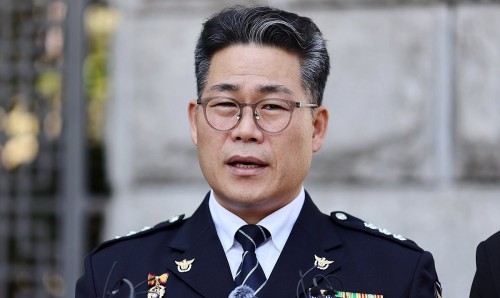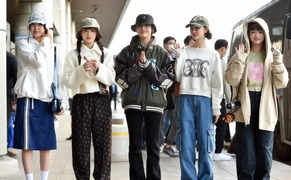 |
| Police Superintendent Baek Hae-ryong speaks outside the Supreme Prosecutors’ Office in Seoul on Oct. 12, expressing his views on the launch of a joint investigation team into alleged interference in the Incheon Customs drug probe. / Source: Yonhap News |
Police Superintendent Baek Hae-ryong, who is at the center of allegations of interference in an Incheon Customs drug investigation, has been granted authority to lead the very case in which he is a victim. The move—ordered by President Lee Jae-myung and executed through a special investigative team—is being described as an unprecedented situation that critics say undermines the nation’s criminal justice system.
The Seoul Eastern District Prosecutors’ Office said on Oct. 17 that Baek was granted final authority over warrants and indictment decisions for all cases except those in which he is a victim or complainant. His request for independent investigative powers was effectively approved. Four additional police officers are expected to join his team soon, giving Baek operational control to pursue the case autonomously.
Observers warn that this means Baek could simultaneously serve as both team leader and victim, leading an investigation while also being questioned by another unit within the same office. Legal experts say such a dual role has no precedent in South Korea’s judicial history.
Adding to concerns, Baek has reportedly renewed his demand for more investigators, potentially setting up another clash with Seoul Eastern District Chief Prosecutor Lim Eun-jung. Before his dispatch, Baek had insisted that at least 25 investigators were needed, far more than the current four. Critics argue that a police officer seconded to the prosecution exerting such influence over its internal structure is “extraordinary and dangerous.” Within the police force, unease is growing that “the entire organization could come under fire if this continues.”
Some analysts say the current turmoil was inevitable from the moment President Lee ordered Baek’s dispatch to the prosecutors’ office on Oct. 12, a move that invited controversy over presidential interference in an ongoing investigation. By empowering Baek, the administration is accused of politicizing a process that should remain impartial.
At a National Assembly audit of the National Police Agency on Oct. 17, ruling People Power Party lawmaker Lee Sung-kwon said, “The Baek Hae-ryong controversy represents the collapse of our judicial system—it’s the joint product of the president, the prosecution, and the police,” while pressing Acting Police Chief Yoo Jae-sung to take responsibility.
A Seoul-based criminal lawyer commented, “It’s unclear what level of authority Baek is actually asking for, but his behavior continues to raise questions,” adding, “This unprecedented situation will likely lead to further legal disputes.”
Most Read
-
1
-
2
-
3
-
4
-
5
-
6
-
7





















